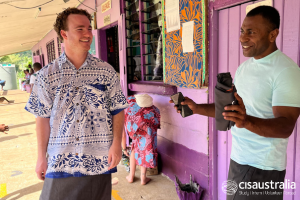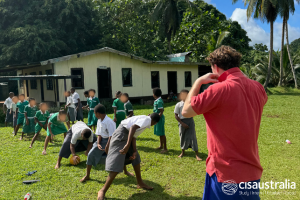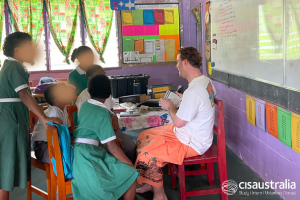Reading time: 5 min
One year ago, Patrick, a Bachelor of Primary Education student from the Queensland University of Technology (QUT), stepped out of his lecture theatre and onto a plane bound for Fiji. What followed was a two-week teaching and community development program that would shift his perspective on learning, reshape his approach to teaching, and ignite a deeper sense of purpose in his future profession.
“It’s made me so much more confident with my teaching and making positive connections with people from a completely different way of life,” Patrick reflects.
Now in his third year of university and completing school placements back in Australia, Patrick is still drawing on the experience. Not only in a broad sense, but also in real, practical ways.
From Textbook to Practice

Patrick earned academic credit for the program by utilising one of his electives, and later presenting on his overseas teaching experience to a first-year education class in Australia. However, the impact of the program extended far beyond ticking a box.
“I learnt the importance of simplifying language and being clear and explicit with my teaching,” he explains. “This is a skill that I am still developing, but it’s been so beneficial in my school placements here in Australia.”
It’s this transferability of learning, seeing how classroom strategies work in new contexts, that makes experiences like Patrick’s so valuable. By adapting to environments where English isn’t always spoken and resources are limited, he developed a flexibility that’s difficult to simulate in a domestic classroom.
“There were times I had to provide classroom support without a plan in place – no internet, sometimes no common language,” Patrick says. “It pushed my problem-solving skills and taught me to go with the flow.”
Cultural Awareness, Confidence and Rapport
 While his university studies had already instilled the theory behind building student rapport, Fiji brought that theory to life.
While his university studies had already instilled the theory behind building student rapport, Fiji brought that theory to life.
“Working as a teacher aide and completing placements now, it’s taught me how powerful conversations about culture can be with students. Showing a genuine interest helps build trust.”
Each morning, as he ate breakfast on the veranda, children would pass by and call out “Yadra!” – a simple yet powerful greeting that signalled connection.
Then each afternoon, rain, hail or shine, they’d return for a game of rugby. “It became a routine,” Patrick recalls. “Me trying to keep up with the kids in the mud!”
These moments weren’t just joyful. They were formative. “It showed me the impact teachers can have,” he says. “I’ve become more motivated to finish my degree and be that role model for my students.”
Beyond the Program
 Patrick’s relationship with the community didn’t end when the plane touched down in Australia.
Patrick’s relationship with the community didn’t end when the plane touched down in Australia.
“Late last year, a group from the Fijian school visited Australia,” he shares. “The principal, two teachers, and a few students. I work in a boarding school and was able to host them, showing them around Brisbane and the Gold Coast. It felt like closing the loop.”
These reciprocal relationships, where students not only visit but host, are a testament to the deep connections built through learning abroad.
Why This Matters for Higher Education
For academics across disciplines, from health and humanities to STEM and education, Patrick’s experience offers a compelling case study of how immersive overseas programs can enrich student learning and development.
These short-term learning abroad experiences can:
- Deepen intercultural competency and promote inclusive thinking
- Reinforce academic theory through real-world application
- Improve student motivation, critical thinking, confidence and employability
- Build meaningful connections with international communities
Ultimately, these programs help shape well-rounded, future-ready graduates who are prepared to navigate diverse professional and social contexts.
“I was surprised by how quickly I adapted to the Fijian way of life,” Patrick says. “By the end of the trip, it felt weird to rush or even wear shoes. I got really comfortable wearing a sulu and doing everything barefoot.”
In a time where adaptability and cultural intelligence are critical skills in the classroom, experiences like Patrick’s are more than memorable – they’re transformational.
